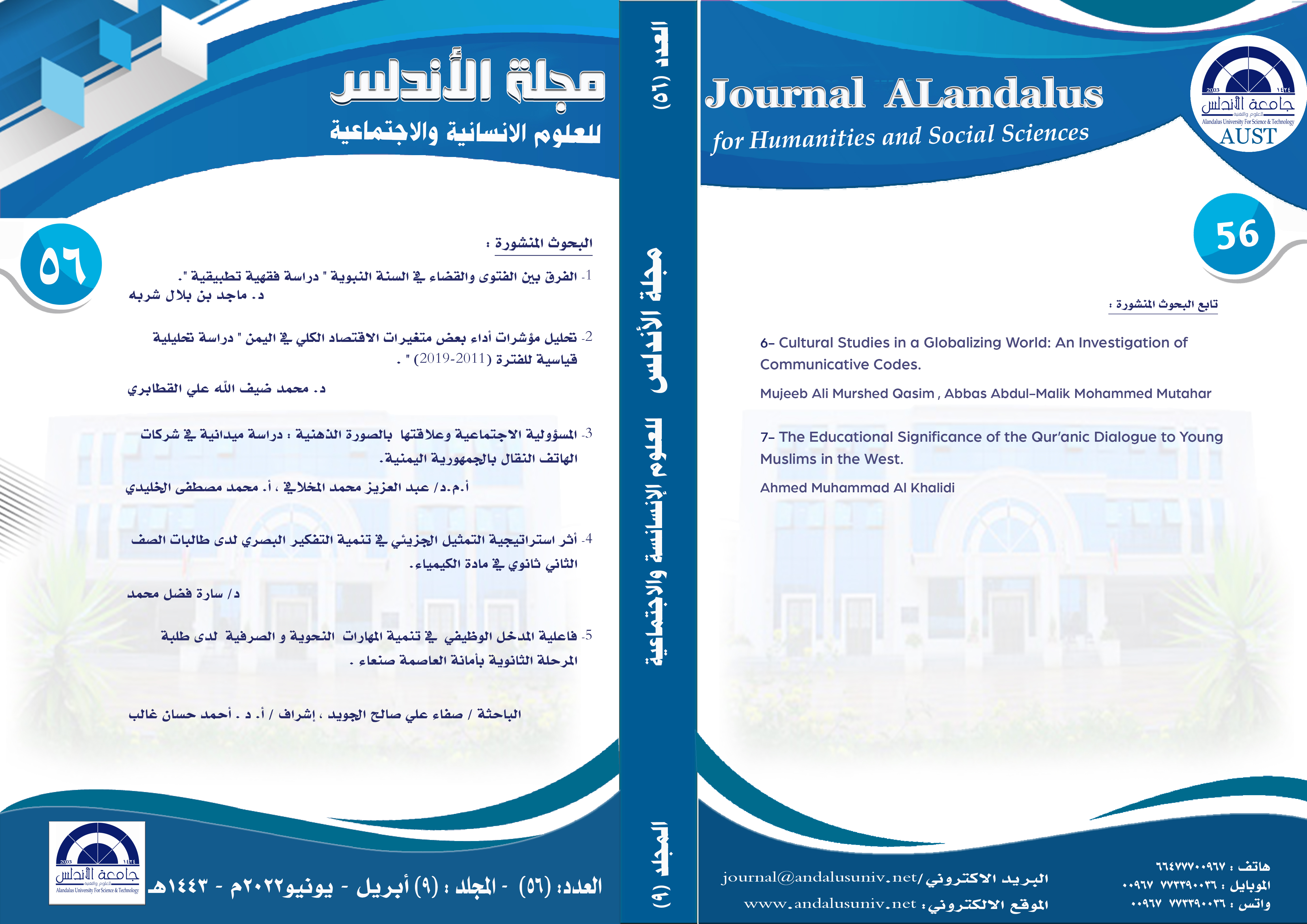The Educational Significance of the Qur’anic Dialogue to Young Muslims in the West الباحث/ أحمد محمد عيسى الخالدي
Main Article Content
Abstract
This study sheds light on the ethical and social difficulties young Muslims face in the West. It aims to help Young Muslims fit socially without sacrificing the principles of their religion, to acquire Qur’anic teachings and guidance, and assimilate Islamic principles and moral values that help them lead a righteous life. It attempts to achieve that through exposing young Muslims to the Qur’anic educational significances and lessons as well as the moral values and Islamic principles derived from two types of Qur’anic dialogue: the exchange dialogue and the speech dialogue. It seeks to develop a plan that enhances acquisition of ample Qur’anic knowledge and guidance, assimilation of Qur’anic ethical conducts, Islamic codes and social morals. It also seeks to provide Young Muslims with Qur’anic teachings that strengthen their faith and immunity against non-Muslim passive social influences. As well, it helps Young Muslims refute the false claims about Islam. Moreover, this study recommends educationalists to help young Muslims eliminate indifference toward their religion, foster trust in themselves toward their Islamic identity and transfer this study into educational programs, and conduct further study from another perspective. Finally, this study concludes the abolition of young Muslims' ignorance of their religion and fostering the pure Islamic doctrine in their hearts.
Keywords: Holy Qu'ran, Qur’anic dialogue, Qur’anic verses, educational significance, moral values, Islamic principles, young Muslims, ethics
Article Details
References
Abu-Shuraikh, S. T. (2005). “The Educational Principles and Psychological Fundamentals in the Holy Qur’anic Storytelling.” Amman Printer, Amman.
Ajmi M. A. (2001). “Islamic Education Rules and Applications." International Centre for publication, Riyad.
Albani, A. R. (1983). “Entrance to Education in the Light of Islam.” Islamic Office, Riyadh.
Ali, A. (1934). “Translation and commentary of The Glorious Kur’an.” Dar AL Fikr, Beirut.
Ammoush, K. (2005). “The Qur’anic Speech (A study in the relation between the text and context)." Hashimite University, Irbid.
Ashi, A. (2007). “Dialogue Between Muslims and People of Scriptures.” Journal of Social Studies. Volume 13, No. 25, Sana’a.
Atiyeh, K. M. (2000). “Parables and Brief Biographies.” Makkah Bookshop, Makkah.
Baz, A. (2007). “The Educational Interpretation of the Holy Qu'ran.” Dar AL-Nashr for Universities, Cairo.
Farahat, M. M. (1994) “Preventive Education in Face of Disasters and its Features in Islamic Origins.” Dar AL Mandhoma, Riyadh.
Ghaili, A. M. (2003). “How Does The Qu'ran Programme Life?” Dar AL-Nashr for Universities, Sana’a.
Hilali, M. T. etal. (1983). “Translation of the Meanings of The Noble Qu'ran.” King Fahd Complex for the Printing of The Holy Qu'ran, Al Madinah Al Monawarah.
Jam'an, H. A. etal. (2016). “The Holy Qu'ran Reflection and Work.” AL Menhaj Centre for Educational Supervision and Training, Riyadh.
Khalidi, S. A. (1989). “Along with Predecessors' Stories in the Holy Qu'ran.” Dar AL Basha'er, Damascus.
Maghamsi, S. B. (2004). “Education by Dialogue.” Dar Alwatan for Publication Mawlawi, Jeddah.
Nahlawi, A. R. (2004). “Fundamentals of Islamic Education.” Dar AL Fikr AL Mu'aser, Beirut.
Othman, H. I. (2004). “Fundamentals of Dispute and Debate in The Book and Sunneh.” Majd for Publication, Beirut.
Rajab, M. (2008). "Research in Qur’anic Education." AL Ameriah Alexandria, Egypt.
Rahil B. in Al Taj A. M. (2008). “Status of woman in the West.” Bayan magazine, No. 150. Sana'a.
Saboni, M. A. (1981). “Safawat AL-Tafasir.” The Holy Qu'ran Publishers, Beirut.
Sa’di, A. R. (1995). “Tafsir Alkarim Al Rahman." AL Bayan Magazine, Riyadh.
Safadi, Ahmed Issam (1992). “Fundamentals of Education in Islam/Concepts and Rules.” Conference Article. King Saoud University and the Saudi Association for Educational Sciences and Psychology, Riyadh.
Shaker, M. M. (2006). “On the way of our culture.” Dar Al Madani, Jeddah.
Shershal, A. B. A. (2001). “The Sources of Education and Teaching and their effect on building up personality and its balance as prescribed in the Holy Qur’an.” Al Sirat Magazine, University of Algeria, Algeria.
Tom, B. H. (1990) “The way for building up Islamic Educational Thought for the Educator.” Educational and Psychological Research Centre, Omm Al Qura University, Makkah.
Valiante. (1986). http//www.the modern religion.com family/challenges.
Zeidan, A. K. (1998). "Al-Mustafad from Qur’anic Stories." Al Resaleh Publishers, Beirut.

